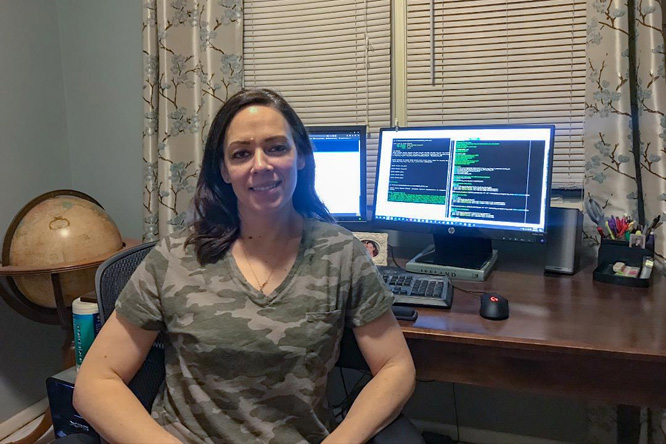Jennifer Bernard, ’16, sees herself as unreasonably persistent when faced with challenges. As her time at the University of Nebraska–Lincoln ends this spring with a Ph.D. in economics, she recounts how it all began with her exiting college early.
A first-generation student, Bernard came to Nebraska pursuing a degree in mechanical engineering, which became a short-lived endeavor.
“I was terrible at mechanical engineering. I failed in every way you can imagine. Eventually I decided, I can either fail out of school or I can figure out something to do, so I ended up joining the military,” explained the Omaha, Nebraska, native.
 Moved to remote teaching and learning due to COVID-19, Bernard cozily set herself up in her home office.
Moved to remote teaching and learning due to COVID-19, Bernard cozily set herself up in her home office.
Life brought Bernard back to Nebraska quickly after she received her undergraduate degree in economics – a newfound interest of hers. After completing her master’s degree at the College of Business, she earned a spot in the Ph.D. program in economics.
Bernard began researching alongside distinguished faculty, specifically focused on taxation aspects of economics. Her focus shifted when she began working with Dr. Danny Tannenbaum, assistant professor of economics.
“When Dr. Tannenbaum joined the college, I was assigned to work with him as a research assistant. He's a labor-oriented person in economics, so the more we started working together, the more I was drawn to these labor questions. It's been awesome working with him,” she said.
As the two worked on projects together, Tannenbaum pushed for Bernard to take her research to the next level and apply for fellowships. She constantly faced rejection after several attempts, leaving her feeling downtrodden.
“I've been applying for the fellowships every summer and been turned down repeatedly. This profession is full of rejection and every time, I would feel horrible, like I wasn’t good enough,” she said.
Tannenbaum, who recently finished his own Ph.D., reminded Bernard how rejection was part of the process.
“The path to the Ph.D. is incredibly demanding, and both mentally and psychologically draining. I think my experience – not being too far out of the Ph.D. myself – as helpful. I try to share my own stories of rejection, which is the most common and natural part of the research process,” he said.
Bernard kept applying and her perseverance paid off last year when she earned a summer fellowship with the U.S. International Trade Commission in Washington D.C. and a dissertation mentorship through the U.S. Census Bureau Center for Economic Studies – one of only 45 in the past 10 years. She credits her success to Tannenbaum’s support during those difficult days.
“Having a faculty member guide you through all the rejection has probably been the best thing for me, because I take rejection to heart. I probably would have quit this program five times over if Dr. Tannenbaum hadn’t convinced me to keep going,” she said.
With graduation on the horizon, a job as an economist as the U.S. Census Bureau awaits Bernard. In the meantime, she prepares to defend her dissertation from home due to COVID-19 recommendations.
“Though I miss chatting with fellow students and professors when ideas or techniques are fresh in my mind, our department is staying engaged even though we are apart. We have a group Zoom online meeting once a week to discuss recent papers or watch lectures from the American Economic Association,” she said.
To learn more about the Ph.D. programs at the College of Business, visit:
https://business.unl.edu/phd.
Published: April 14, 2020